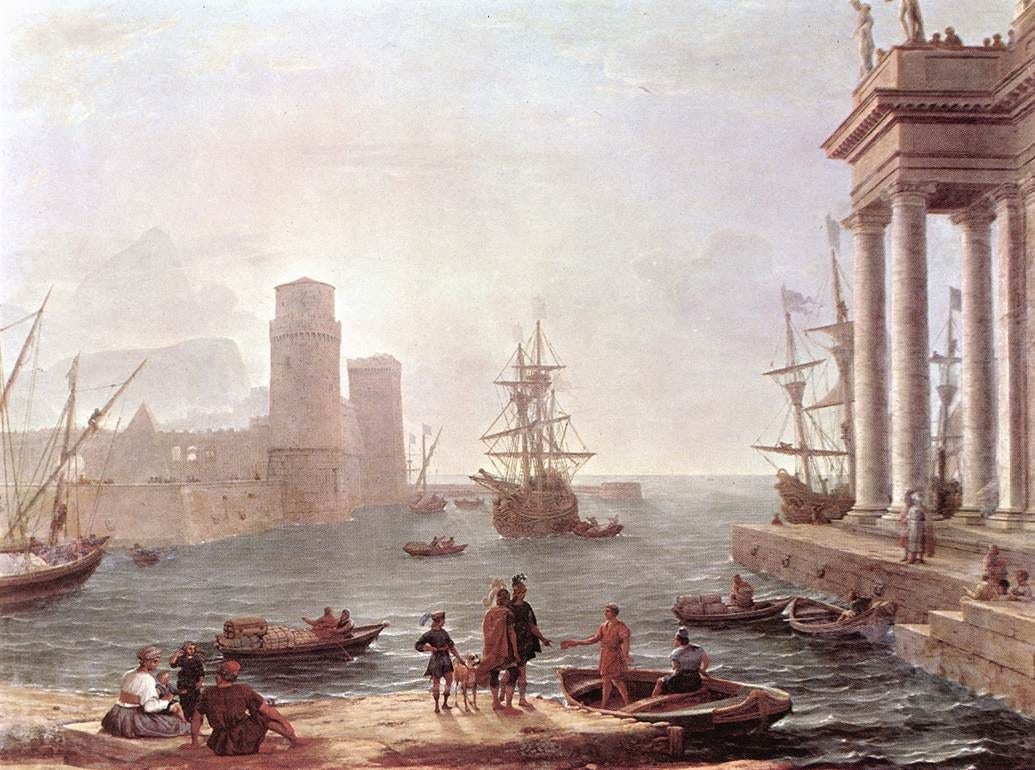
Dear Classical Wisdom Readers,
We almost took a turn away from the very serious and profound. Last week Classical Wisdom Members were treated to a Classical guilty pleasure - one of the raciest, raunchiest and outright hilarious plays of the ancient world - the delightfully subversive comedy “Lysistrata”.
Members, you can access it here:
But underneath most comedy (maybe slapstick aside) there are extremely important and poignant insights. And perhaps no other did a better job of exploring critical current events with a cry inducing belly laugh, than the prince of Comedy: Aristophanes.
His commentaries on the happenings of his time of course are of great historical significance and indeed are sometimes truer than the biased biographies and annals the serious historians penned down... As the aptly named American comedian Sid Caesar once quipped:
“Comedy has to be based on truth. You take the truth and you put a little curlicue at the end of it.”
But the genius of Aristophanes is that his insights aren’t restricted to mere ancient news, but with the timeless questions of humanity as well...
Such as: What is a utopia? What does it look like? And will human nature get in the way?
Indeed, Aristophanes’ answers to these questions are extremely fascinating and forward thinking... and his predictions on a type of communism are simply astounding.
Read on to understand how we envision greener pastures and whether or not they are really possible, according to Aristophanes, below.
Kind Regards,
Anya Leonard
Founder and Director
Classical Wisdom
P.S. It’s not just Greek comedy that can give us new perspectives on the ancient world, the Romans (and north Africans) also had their share of comedic geniuses! Members, ICYMI, you can enjoy our Ebook and KEY to Roman Comedy, featuring Plautus and Terence below today’s Member’s in-depth article.
Not a member? Make sure to subscribe to access all our Ebooks and articles:
Aristophanes: Utopia and Human Nature
By Visnja Bojovic
Ever since there were people and places, there has been a desire for other, different people, and ideal, perfect places. This concept is called utopia, a word that has its origin in ancient Greek, as a compound of the word οὐ (ou, ”not”) and τόπος (topos, ”place”). Even though unmistakably Greek, this word was developed much later, in 1516 to be exact, by Thomas More.
In the same manner that the dreaming of a better world is almost as old as the world itself, puns are almost as old as the words themselves. Thus, when coming up with this concept of no-place, Sir More was playing with the word eu-topos, which meant ”a good place”. Coincidence? Let’s see.
Even though the concept of utopia, or utopian literature, was not invented by the Greeks as such, it was present in Greek thought and literature starting as early as in Homer’s works. (For example, the land of Phaeacians in the Odyssey).
The main characteristics of utopia are the lack of existential worries that occupy our minds every day, the lack of corruption and injustice, and, most importantly, a location that is remote either in the sense of space or time.
Thus, we have the so-called nostalgic utopia, such as the one found in Hesiod’s didactic poem Works and Days, where the distant past is referred to as golden and considered perfect and irretrievable. There are also completely fictional utopias, in invented lands with invented people (as the one in the Odyssey).
Another distinction, and the more important one if you ask me, is that of the utopias of reconstruction, and the utopias of escape. In the latter, a protagonist is sick of the actual world, and his only wish is to escape to another, typically, non-existent one. This kind of utopia does not have a goal to change the world or come up with a new one.
In the former, on the other hand, as the name itself indicates, the author intends to reconstruct, or reinvent the world. The most well-known example of this is Plato’s ideal state in the Republic. Plato comes up with a whole new system of government and distribution of goods, where he implements a radical change of everything in favor of equality. However, as it turns out, ”all the animals are equal, but some are more equal than the others”.
Thus, Plato gives the advantage to philosophers, who should be rulers, because they are wise and, as such, capable of governing the state perfectly.
So far, I have mentioned the main types of utopia that can be found in ancient Greek literature. However, we encounter complications when trying to classify all the utopias of one specific author into these categories. There were, and still are, many disputes regarding the goal of constructing the utopias of this author. As you’ve probably guessed, I am talking about Aristophanes, in whose works we can identify traces of the utopian concept.
These utopias tell us a lot about the problems that the Athens of Aristophanes’ time was facing, and there were quite a lot of them. For example, it was obvious that in Peace, where the main plot is a great desire for peace in Athens devastated by constant war and conflict, Aristophanes was trying to point out the pointlessness of wars and its disastrous effects. Similarly, in the Clouds, the criticism of sophistic teaching and the dangers of its popularity is fairly obvious.
However, what I think is far more important, and far more profound is the implicit criticism that Aristophanes carefully implemented in his comedies, step by step as the plot advances...
Más info en frasco@menadelpsicologia.com / Tfno. & WA 607725547 Centro MENADEL (Frasco Martín) Psicología Clínica y Tradicional en Mijas Pueblo #Psicologia #MenadelPsicologia #Clinica #Tradicional #MijasPueblo
*No suscribimos necesariamente las opiniones o artículos aquí compartidos. No todo es lo que parece.

No hay comentarios:
Publicar un comentario